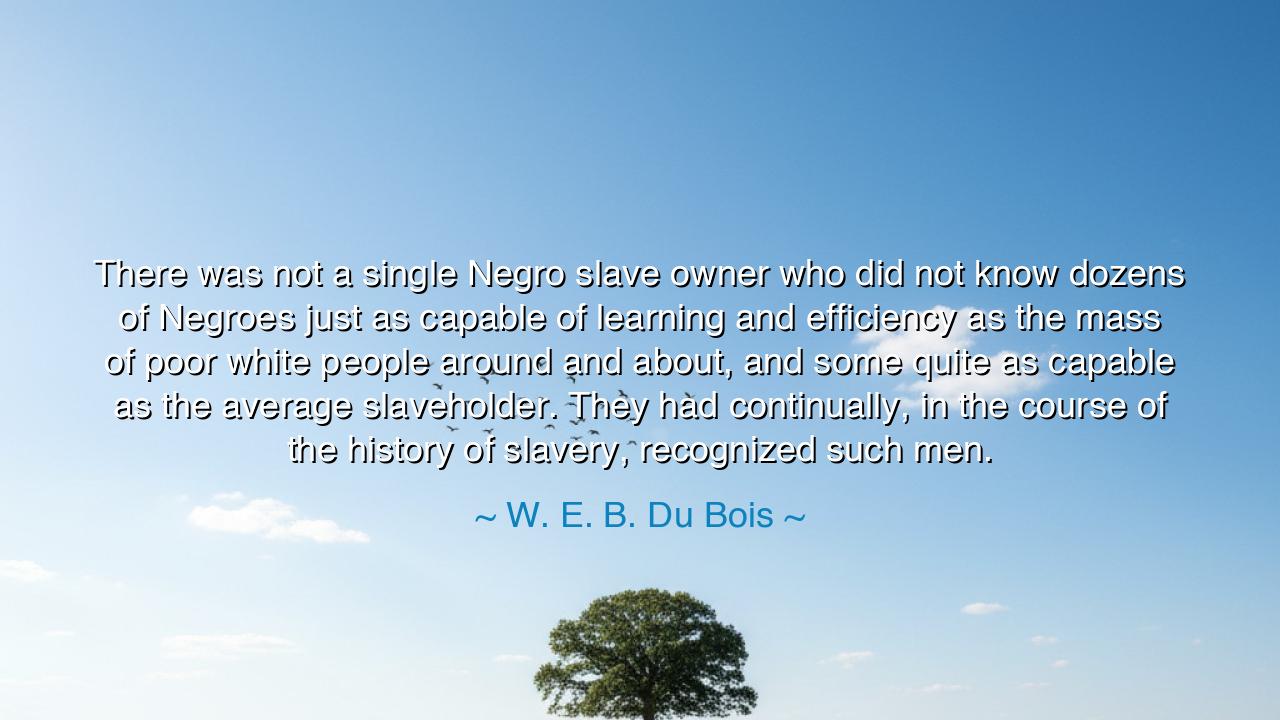
There was not a single Negro slave owner who did not know dozens
There was not a single Negro slave owner who did not know dozens of Negroes just as capable of learning and efficiency as the mass of poor white people around and about, and some quite as capable as the average slaveholder. They had continually, in the course of the history of slavery, recognized such men.






When W. E. B. Du Bois wrote, “There was not a single Negro slave owner who did not know dozens of Negroes just as capable of learning and efficiency as the mass of poor white people around and about, and some quite as capable as the average slaveholder. They had continually, in the course of the history of slavery, recognized such men,” he was tearing away the veil of falsehood that long cloaked the conscience of a nation. Beneath these words lies both fury and truth — the unmasking of the lie that slavery was ever founded upon the inferiority of Black people. Du Bois, in his eternal brilliance, reminded the world that the tragedy of slavery was not ignorance of Black potential, but the deliberate suppression of it. Those who held the whip knew the intelligence of the enslaved; they saw it daily, in labor, in craftsmanship, in intellect, and in dignity — and yet they chose power over justice, domination over equality.
The origin of this quote lies in the heart of Du Bois’s lifelong struggle against the mythology of white supremacy. Writing in an age when history had been rewritten to justify oppression, he sought to restore the truth: that the enslaved were not passive, ignorant victims but human beings of immense ability and potential, whose brilliance was stifled by chains rather than absence of mind. In his work Black Reconstruction in America, Du Bois chronicled how, even within bondage, Black men and women built, taught, organized, and led — proving that intelligence and virtue were never bound by race. His statement here exposes a moral paradox: that the masters knew the equality of the enslaved and yet perpetuated their subjugation for profit and pride.
In the language of the ancients, we might say that Du Bois’s words reveal the hubris of empire — the sin of those who, knowing truth, deny it to preserve power. The Greeks would have called such blindness ate, the arrogance that leads men to moral ruin. The American slave system was not founded upon ignorance but upon willful deceit, upon the fear that if Black intellect and ability were ever acknowledged, the entire edifice of slavery would crumble. Thus, Du Bois’s insight becomes not merely historical, but universal: every tyranny depends upon a lie it secretly knows to be false. The slaveholders saw capability in the enslaved, but to admit it would have been to indict themselves.
Consider the story of Frederick Douglass, born into slavery yet destined for greatness. His master once said that teaching him to read would “forever unfit him to be a slave.” In that single confession lies Du Bois’s entire argument — the recognition that the enslaved possessed the same mental power as any free man, and that knowledge would make that equality undeniable. Douglass’s mastery of language became his liberation. The very people who sought to keep him bound acknowledged, through their fear, his capacity for learning and efficiency. They knew the truth but dared not face it.
Du Bois’s words burn with moral clarity: that oppression is never sustained by ignorance alone, but by the corruption of conscience. The enslavers recognized ability but refused to honor it. They saw potential but crushed it to maintain hierarchy. They looked into the eyes of men and women who mirrored their own humanity, and chose to pretend otherwise. Thus, the crime of slavery was not only physical but spiritual — the deliberate blinding of the soul to the light of equality. Du Bois forces us to confront this ancient evil, which still haunts humanity: the ease with which power silences truth.
Yet within this truth lies hope. If the enslaved could demonstrate genius even in chains, then what heights might be reached in freedom? Du Bois believed that education, art, and thought were the weapons of redemption, the means by which Black people — and all oppressed souls — could reclaim their rightful place in the human story. His quote is both accusation and prophecy: the world cannot forever deny what is evident to the honest eye. The capacity for greatness lies in every heart, awaiting only the soil of opportunity and the light of justice to bloom.
The lesson of this teaching is clear: never believe the narratives of limitation that power imposes upon the powerless. Whether in race, class, or gender, those who rule often recognize the strength of those they subdue — and build systems to conceal it. Our duty, as seekers of truth, is to see through those illusions. Honor learning wherever it is found. Recognize talent, nurture it, and defend it against the chains of prejudice. For knowledge, as Du Bois teaches, is both a mirror and a weapon — it reflects our shared humanity and breaks the fetters of falsehood.
So let this truth be passed down as ancient wisdom: the measure of a people’s worth is not what the powerful say of them, but what they have always known of themselves. W. E. B. Du Bois calls to us across the centuries to remember that knowledge and ability belong to no race, no class, no nation — only to the human spirit. And when that spirit rises, no chain, no lie, and no empire can hold it down forever.






AAdministratorAdministrator
Welcome, honored guests. Please leave a comment, we will respond soon